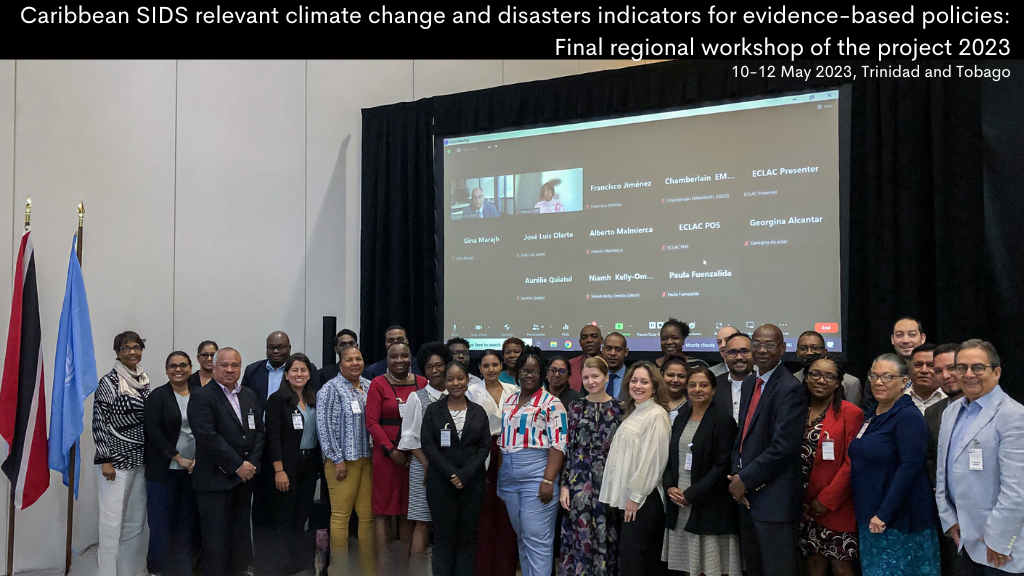Caribbean SIDS relevant climate change and disasters indicators for evidence-based policies: Final regional workshop of the project 2023
Área(s) de trabajo
Resumen
Institutionalizing sound evidence-based sustainable development policies in the Caribbean requires quality, timely, and accessible climate change and disasters indicators that are harmonized and comparable across countries.
Información del evento

Fecha
10 - 12 May 2023, 05:00 - 13:00Tipo de evento
Background
The Statistics Division and the Subregional Headquarters for the Caribbean of the United Nations Economic Commission for Latin America and the Caribbean (ECLAC), in collaboration with United Nations Statistics Division (UNSD), the Caribbean Community (CARICOM) Secretariat and the Organisation of Eastern Caribbean States (OECS) Commission and The Partnership in Statistics for Development in the 21st Century (PARIS21) have been working together since 2020 with selected Caribbean countries at the national level to strengthen institutional and statistical capacities to better produce, disseminate and use environment, climate change and disaster indicators. Work at the country level has helped in identifying coordination and data sharing as the most critical areas where exchange of knowledge and experiences and peer learning at the regional level bring the most value for countries. This final regional workshop as part of the Development Account 12th Tranche (DA12) project on Caribbean SIDS relevant climate change and disasters indicators for evidence-based policies is being organized to share the experiences of the countries through the project and a final compilation of the main products of the project.
Objective
This workshop will be a space for the project management and beneficiary countries to share the results achieved and experiences generated through this mission. The project implementing agencies of the United Nations will show the main results gained in the region and stakeholders from National Statistical Offices, Ministries of Environment, and Emergency and Disaster Management authorities of members and associate members of the Caribbean Development and Cooperation Committee (CDCC) will share their own point of view on the acquired experiences and knowledge gained in the environment, climate change, and disaster statistical areas in their organisations hence of the project.
The objectives of the workshop are to:
- Enable a safe space for participants to share the specific challenges identified and their own learnings about the coordination and data sharing processes of environment, climate change and disaster statistics.
- Present the accomplishments of the DA12 project on “Caribbean SIDS relevant climate change and disasters indicators for evidence-based policies”.
Programa de trabajo
Opening session
Moderator: Abdullahi Abdulkadri, Coordinator, Statistics and Social Development Unit, ECLAC Subregional Headquarters for the Caribbean
Opening ceremony
• Dillon Alleyne, Deputy Director ECLAC Subregional Headquarters for the Caribbean
• Rolando Ocampo, Director, Statistics Division, ECLAC
• Chamberlain Emmanuelle, Head, Environmental Sustainability Division, OECS Commission
• Reena Shah, Head of Environment Statistics Section, UNSD
• Paz Patiño, Paris21
• Satee Boodoo, Assistant Director of Statistics, CSO, Trinidad & Tobago Government
Presentación(es)
Session 1: The DA12th project. A summary of the project's progress
Presentación(es)
▪ Visualisation exercices
» Questions and Answers
Session 2: Contributions of international partners. The perspective of our main partners
Presentación(es)
Climate change data ecosystems for better climate action
UNSD’s perspective: Accomplishments of the DA12 project and further engagement
» Questions and Answers
Session 3: Contributions of regional partners. The perspective of our main partners
Presentación(es)
Priorities from the Sustainable Development and Human Settlements Division
» Questions and Answers
▪ Conclusion of the day
Session 4: Countries perspective of the DA12 benefits
Moderator: Janet Martin, ECLAC
Welcome, overview of Day 1
| Francisco Jimenez, ECLAC ▪ Interactive feedback from the participants (Slido) |
To promote the interchange of the national point of view about the DA12 project and its outcomes and the possible uses of their statistical work to support national policy making.
Presentación(es)
▪ Summary session 4
Session 5: Data communications for advancing climate action
During this workshop facilitated by PARIS21, participants will learn about good practices and principles for impactful communication of national climate change, environment, and disaster indicators.
Presentación(es)
▪ Getting-started: How can you communicate data for impact in decision making?
▪ Group Activity Part 1: Identifying an environmental issue that matters and finding its data
▪ Group Activity Part 2: Defining the audience of your information
▪ Group Activity Part 3: Developing a communication data product that matters to the audience
Session 5: Data communications for advancing climate action (conclusion)
Moderator: Alberto Malmierca, ECLAC
Welcome, overview of Day 2
Presentación(es)
Feedback conversation about the day before experience
Session 6: Sustainability of project outcomes
Possible future to maintain the interchange result of DA12 project on the region.
Presentación(es)
Interactive feedback from the participants (Slido)
Session 7: Other initiatives for collaboration with environmental, climate change and disaster statistics
Possible spaces to collaborate:
Presentación(es)
» Questions and Answers
Session 8: Some ideas for next steps
| What is next? What can we do? |
| Conversation: - Needs identification. - Collaboration spaces. - Topics and tools reviewing |
Closing ceremony
[[{"fid":"113640","view_mode":"default","fields":{"format":"default","alignment":"center","field_file_image_alt_text[es][0][value]":"photo-caribbean-sids-relevant-climate-change-may2023.png","field_file_image_title_text[es][0][value]":"Participants of the final regional workshop of the project Caribbean SIDS relevant climate change and disasters indicators for evidence-based policies","field_file_image_credits[es][0][value]":"","external_url":""},"type":"media","field_deltas":{"1":{"format":"default","alignment":"center","field_file_image_alt_text[es][0][value]":false,"field_file_image_title_text[es][0][value]":false,"field_file_image_credits[es][0][value]":"","external_url":""},"2":{"format":"default","alignment":"center","field_file_image_alt_text[es][0][value]":"photo-caribbean-sids-relevant-climate-change-may2023.png","field_file_image_title_text[es][0][value]":"Participants of the final regional workshop of the project Caribbean SIDS relevant climate change and disasters indicators for evidence-based policies","field_file_image_credits[es][0][value]":"","external_url":""}},"attributes":{"alt":"photo-caribbean-sids-relevant-climate-change-may2023.png","title":"Participants of the final regional workshop of the project Caribbean SIDS relevant climate change and disasters indicators for evidence-based policies","class":"media-element file-default media-wysiwyg-align-center","data-delta":"2"}}]]
Presentación(es)
Información práctica
Language
The working language of the workshop was English.
Sede(s) subregional(es) y oficina(s)
Institución organizadora
Comisión Económica para América Latina y el Caribe (CEPAL)
- https://www.cepal.org
- 56 222100000
Oficina Subregional de CEPAL para el Caribe
- http://www.cepal.org/en/headquarters-and-offices/eclac-caribbean
- (868)224-8000
División de Estadísticas de las Naciones Unidas (DENU)
- https://unstats.un.org/home/
- Fax +1 (212) 963-9851
PARIS21 (Partnership in Statistics for Development in the 21st Century)
- https://www.paris21.org/
- +33 1 45 24 90 51.
Contacto
División de Estadísticas
- estadisticas@cepal.org